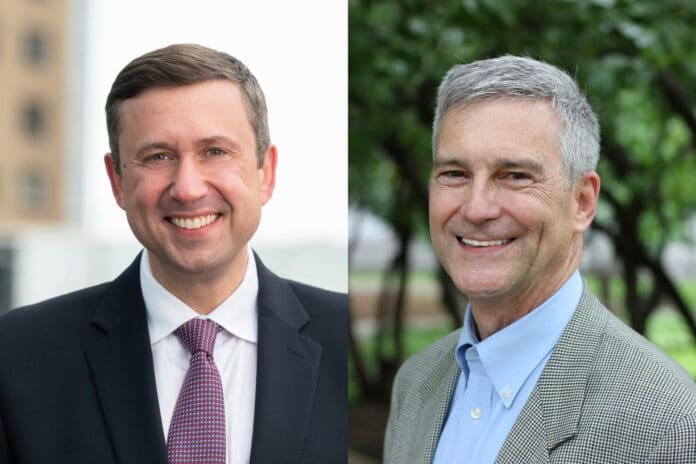
In a moment of nonpartisan unity, the respective chairs of the Republican and Democratic-Farmer-Labor (DFL) parties in Minnesota made a pitch yesterday that all politics is local. And that local voices are what shape the political process up to the highest levels of elected office.
Precinct caucuses will take place in churches, schools, and other buildings across the state at 7 p.m. this Tuesday evening (Feb. 27).
David Hann and Ken Martin appeared at a joint press conference at the State Capitol on Monday to deliver a message that participation is key to making an influence. The Minnesota Secretary of State website has links for participants to find their precinct caucus location, based on home address.
Participating in the precinct caucuses “is a way to have a voice in the selection of candidates, and the governance of the party, and also this year the selection of delegates to the national conventions,” Hann said to a room of political reporters.
Hann and Martin, who often garner the most attention when they engage in criticism of one another, stood shoulder to shoulder promoting what they say is the most often overlooked but vital component of their respective success in elections — the grassroots element.
“Both of our parties are grassroots parties that respect the voices of people who participate. Neither of our parties are top down, even if it at times feels like it,” Martin said.
In that spirit, Hann and Martin encouraged Minnesotans who identify as either Republicans or Democrats to attend their precinct caucus on Tuesday evening, of which there are more than 4,000 taking place across the state, according to the Secretary of State.
What takes place at a precinct caucus?
Precinct caucuses are held every year and are organized by each of the Basic Political Operating Units for each party, which are often singular Senate districts, or in some cases a conglomeration of Senate districts. At the respective parties’ precinct caucuses, participants elect local officers and delegates to serve in their BPOU or Senate district. Often times those delegates come specifically to support a candidate seeking the party’s endorsement for state legislative office or U.S. congressional office. Eventually those delegates make it to a Senate district convention and a congressional convention for the party where they have the power to decide who will receive their party’s endorsement for office.
Presidential preference ballots a thing of the past
What participants won’t have the opportunity to do at caucuses tonight is participate in a presidential preference straw poll that used to be a major attraction for those who don’t normally participate at the precinct caucus level. That changed after the 2016 election cycle, via legislation. Minnesota now holds presidential primaries on a separate date, as a method of assigning delegates to candidates vying for their party’s nomination. Minnesota’s 2024 presidential primary for both the GOP and DFL will take place Tuesday, March 5.
While that primary may not be much of a contest, voters will still have choices on either the Republican or Democratic ballots. Presumptive nominees at this point are former President Donald Trump and President Joe Biden, although Democratic longshot challenger and Minnesota Congressman Dean Phillips is still campaigning, along with Republican Nikki Haley, who visited Minnesota on Monday.
“If the presumptive nominees are who everybody thinks the presumptive nominees will be, this will be a very close race in Minnesota,” Hann said.
While Hann and Martin admitted on Monday that they are both prepared to dig in for a long eight-plus months of political mudslinging as they battle for control of the Minnesota House of Representatives and support the congressional and presidential campaigns of their respective parties, they said the February precinct caucus night is a reminder that both parties have the same goal.
“We are not enemies, we are competitors,” Hann said. “We have different views of the best way to achieve the goals that we believe are going to serve the interests of the whole state.”
To participate in the DFL caucus, voters must:
- Be at least 16-years-old
- Generally agree with the principles of the party
To participate in GOP caucus, voters must:
- Be eligible to vote in the coming election
- Generally agree with the principles of the party
Hank Long
Hank Long is a journalism and communications professional whose writing career includes coverage of the Minnesota legislature, city and county governments and the commercial real estate industry. Hank received his undergraduate degree at the University of Minnesota, where he studied journalism, and his law degree at the University of St. Thomas. The Minnesota native lives in the Twin Cities with his wife and four children. His dream is to be around when the Vikings win the Super Bowl.












